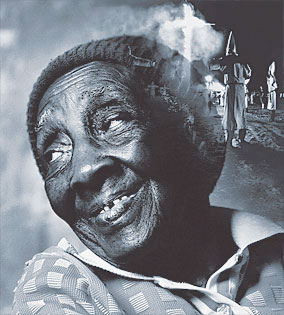Who We Are

Who They Are

Who You Are

Get Connected

Pearl Gartrell
b. April 1, 1888
Tillsdale, Georgia. USA
 It was not yet nine o'clock in the morning and the heat was rising out of the grass. I had found Pearl and her grandniece Lolita in a modest apartment in a rundown section of Jacksonville, Florida. The screen door hung from the hinge, and children ran around playing between the buildings and two girls played jump rope but cast a curious eye toward me, the white guy with a load of equipment.
It was not yet nine o'clock in the morning and the heat was rising out of the grass. I had found Pearl and her grandniece Lolita in a modest apartment in a rundown section of Jacksonville, Florida. The screen door hung from the hinge, and children ran around playing between the buildings and two girls played jump rope but cast a curious eye toward me, the white guy with a load of equipment.
Pearl was afraid to come out from behind the door. Her grandniece had to coax her into the room. Lolita whispered to me "Granny's afraid of white people." But Pearl came in eventually without a cane, and sat there quietly, holding her picture of Jesus. "It's a pleasure to meet you," I said, offering to shake her hand. She nodded and only lightly touched my hand. Looking out into space and stroking her chin, as if mentally traveling back in time, she began to answer my questions and her words began to flow.
Pearl Gartrell was born on a small farm in Georgia, one of the youngest of thirteen brothers and sisters. Pearl said in a slow, rich Georgia accent, " Mauma, she wasa big woman‘n sit on the porch an watch us work." My ears strained to understand. Her house had been a wooden, unpainted structure that sat up on bricks. "You could see the ground through them cracks" in the floorboards, and the cold coming up in the winter. There was a single, deep-cooking fireplace that served many functions. "Peoples they'd come in" and Pearl remembered her parents blackening the children's faces with soot, telling them to be still, and hiding them in the back of the fireplace when the Klu Klux Klan came to the house. Her father, husband, and two brothers were killed in this small town. Her mother was a midwife and worked for the local white doctor. At times, she dispensed herbal remedies to the family and neighbors. Pearl still doesn't believe in doctors. When anyone in the family was "real sick," "mauma worked off the payment in da house." "So were there any black doctors?" I said. "Dere was dis one he had a hole an put you in fo sa night, jus your head out… for lumbago. I didn't trus im." She chuckled and looked away so as not to look me in the eye.
Daily life was hard. The routine was to be up by dawn, do chores, and be off to a one-room schoolhouse attached to the Baptist church. She and the rest of the children would walk barefoot, carrying their shoes to school and putting them on before entering so as not to wear out the leather. School lasted only a few hours and then it was back to work at the farm "Ida walks behind ar mules, to plough the fields for cotton and tobacco," Pearl said. Not so fondly, she remembered picking cotton until dark, her hands bleeding; she wasn't allowed to quit until she had filled her quota. She remembered the family vegetable plot, "we'd have mor' nough, we gave to those didn't have. Evn gave hogs."
"Granny," Lolita asked, "what did you like to do?"
"Goin hunting for possum, coon, and rabbit," she replied. To this day Pearl's 105-year-old sister still prefers possum for a meal. As a young black woman, the only non-farming work that was available was as an "ironing maid" in the "white man's laundry." Segregation left its mark on her, and she was taught to be submissive and to never talk back. Pearl had two children by "the white man in town." When she heard the "white folks was comin to git them and drown im in a croaker sack in da river," she ran from Georgia.
Yet, in spite of all this, Pearl retains a sense of humor. If you were to ask me why she's as old as she is it seems, I'd guess there are many factors. When I asked her why she's lived as long as she has, she smiled and said because of Jesus, and because she could cry. "Men don't cry, they hold it in," she said.
When I asked if anything through her life had worried her, knowing what kind of life she had lived, she said, " Worry? Worry ain't no good from worrying." "If there was one lesson to pass on to your grandchildren and others what would it be?" I asked. "Trus in da Lord, he's a mighty man."
Then she smiled, an impish sort of smile, but she looked away. She walked to the screen door and peered out as I was leaving. She even waved good-bye to me.
Click here to view the next supercentenarian's story.© 2009 Earth's Elders
